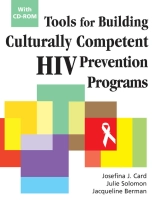A comprehensive guide to creating, implementing, and evaluating culturally competent HIV prevention programs.
Recent literature on effective HIV/AIDS prevention programs underscores the importance of cultural sensitivity and cultural competence in the delivery of services and care. Successful prevention interventions must be tailored for their target populations. Yet many HIV/AIDS prevention professionals struggle to meet the specific needs of their communities.
Tools for Building Culturally Competent HIV Prevention Programs contains a variety of well-informed, evidence-based approaches to HIV prevention programs. It offers all the tools practitioners need to launch an effective prevention program: from identifying program goals and objectives, to developing program models, to recruiting and retaining staff, and finally to conducting evaluations and reporting results. All material is filtered through a cultural perspective and methods are tailored to specific racial, ethnic, and socioeconomic groups.
- Additional resources are included to assist in the preparation and development of your prevention program, such as:
- Federal standards and guidelines for culturally competent health care and social service provision
- True-life case studies that show how other HIV prevention programs succeeded
- Checklists, worksheets and templates to create, monitor, and manage your program
- Customizable checklists and worksheets that you can use in your program
- A demonstration of the Virtual Program Evaluation Consultant (VPEC) software program, a program evaluation service offered by Sociometrics Corporation. Purchasers of this book will get a three-month license to VPEC free
The CD includes :
Use the companion volume, The Complete HIV/AIDS Teaching Kit (with CD-ROM, in your prevention program to assist you in providing an overview of the incidence, prevalence, prevention, and treatment of HIV/AIDS to all your students, patients, or clients.
Tabela de Conteúdo
About the Authors
Acknowledgments
Dedication
Preface
List of Tools
Section 1: Introduction: What Is Culture?
Defining Culture
Where Does Culture Come From?
What Does Culture Have To Do with HIV?
What Is Cultural Competence?
What Does Cultural Competence Have to do with HIV Prevention
Building Culturally Competent Programs
Defining Your Terms
References
Section 2: Culturally Competent Program Planning
Overview
Assessing Needs and Assets
Identifying and Involving Community Leaders
Defining the Problem
Applying Formal Social and Behavioral Theories
Identifying Goals and Objectives
Planning Program Components
Developing and Using Program Models
Replicating Existing Programs Versus Developing New Programs
Adapting Programs
Recruiting and Training Staff
References
Tools
Section 3: Culturally Competent Program Implementation
Overview
Involving Community Leaders in Implementation
Recruiting and Retaining Program Participants
Responding to Target Population Needs
Addressing Language Barriers
Retaining Program Staff
Practicing Culturally Competent Program Management
References
Tools
Section 4: Culturally Competent Program Evaluation
Overview
Integrating Community Leaders into Culturally Competent Program Evaluation
Protecting Human Subjects
Distinguishing Process Evaluation from Outcome Evaluation
Conducting a Culturally Competent Process Evaluation
Using Process Evaluation Results
Assessing Readiness for Culturally Competent Outcome Evaluation
Conducting a Culturally Competent Outcome Evaluation
Reporting Outcome Evaluation Findings
Using Outcome Evaluation Findings
References
Tools
Glossary
Index
Sobre o autor
Josefina J. Card, Ph D, is Founder, President, and CEO of Sociometrics Corporation, an applied social science research and development (R&D) company based in Los Altos, CA. Dr. Card is a nationally recognized social scientist and an expert in the establishment and operation of research-based social science resources, products and services.












